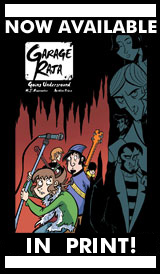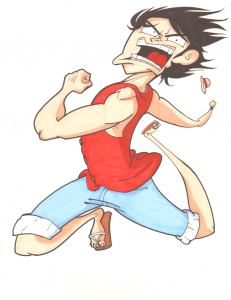
"Monkey D. Luffy" by Matthew J. Rainwater
It is no small secret that I am a massive One Piece fan. I rank it without reservation in my five personal favorite comics, and would argue that it is every bit as significant an adventure series as, say, Jeff Smith’s Bone. Though the action is often stiff and the structure formulaic, the series possesses an unrivaled sense of adventure.  Eiichiro Oda, the author, knows better than anyone how to conceive, contextualize and develop fascinating locales: from an island floating on a sea of clouds to an impenetrable, abyssal dungeon modeled after the six Buddhist conceptions of “hell†(for lack of a better term) to a prehistoric island serving as the battle ground for immortal rivals, Oda crams every last one of the world’s exotic settings with enough style, mystery and character to fuel a hundred spin-offs.  While his contemporaries bore audiences to death with another rehashed slugfest between superpowered freaks padded by trite moralizing and philosophizing, Oda favors thrilling his reader with an unequaled romantic spirit, carried on by a cast of wildly inspired (and sometimes just plain wild) characters and some of the most surreal – though often grating – humor in comics. To know Luffy, the hero, and his cast of merry men (the Strawhat Pirates, so named for Luffy’s signature piece of clothing), is to want to join them. If sometimes it slips into melodrama and overly busy fight scenes, well, that the former can be excepted: because his approach to drama is often clumsy and heavy-handed , Oda is sometimes able in his fumbling to achieve a level of  genuine, unaffected depth and resonance that is, at the best of times, tear-jerking. Only when the series devotes itself to simple pugilism does it become too stiff, too cluttered and too busy for its own good.
So it is a wonder that, over the last six years, One Piece has shifted its tone and focus to become near unrecognizable. What began as a lighthearted story about pirates looking for treasure touched with moments of some dark poignancy has become, ever since Luffy declared war on the world’s central government, an angry polemic about the injustices of organized military, malevolent dictatorships and racism. As if to signal this shift, it was revealed that the titular treasure, the One Piece, was not, as its name suggested, a mountain of treasure(it’s a stash rumored to hold “all of the world’s treasure in one placeâ€) but instead an item of such grave historic importance that it could spur a world revolution. Suddenly, the formerly endearing clumsy gag elements that pepper the series have become intrusive. When Dr. Frankenfurter (of  The Rocky Horror Picture Show infamy) is dancing around and winking giant cyborg bears to death, one should be laughing, but the context is  so solemn and dismal that the joy one finds in these antics is a guilty one: it is hard to laugh when, one panel over, people are having their faces graphically melted off (their ghastly expressions doing nothing to soften the blow). By corollary, what joy is there to be had in following the Strawhats around from an island built on bubbles to an underwater metropolis when the focus is entirely on their struggles against a gaggle of pill-popping racists with an insatiable bloodlust?
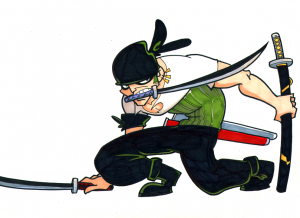
"Roronoa Zoro" by Matthew J. Rainwater
This tonal shift might have been a blessing in disguise if Oda had at least used the chance to expand on the world in a significant way. After all, there have been intimations of some vast global conspiracy stretching throughout the world’s history for some time now; with the war against its perpetrators taking center stage, Oda has a perfect excuse to take the Strawhats through, in a very intimate way, a number of interesting locales, from the still-preserved ruins of a long forgotten civilization to certain fabled, quasi-mythical lands of lore. He seemed to be on just this track when the Strawhats visited Fishman Island, one of the world’s most ancient, important and politically divisive territories, a setting of such significance that it has been referenced since the beginning of the sixty volumes series. But what began with such promise – as readers were bombarded with gorgeous illustrations of alien and enchanting landscapes and hints at some very interesting cultures – quickly became ponderous when Oda squandered everything to showcase the Strawhat’s power levels. Not that this was unexpected. For years, the narrative has existed to do one thing and one thing only: establish the rankings of martial prowess between an endless parade of freaks.
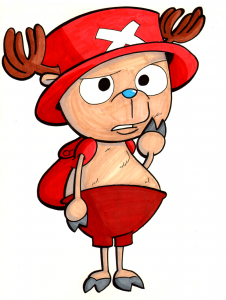
"Tony Tony Chopper" By Matthew J. Rainwater
As a result of challenging the world government, Luffy and the rest of the Strawhats invariably drew down the wrath of the Marines and with it a rather large boost to Luffy’s already substantial bounty. So that now everywhere Luffy and his friends go, they have to contend with either the fanatical justice of the Marines’ best or the malign attention of world-class pirates who finally see the Strawhat pirates as a credible threat. And by “fight off†I mean “barely survive:†Luffy and his crew have become the perennial chumps of the pirate world. Even their few, paltry victories are hard won. Never mind that so much of the fun in One Piece was seeing Luffy’s bounty – which was not, until very recently, a measure of combat prowess but of reputation – increase as he pulled off a series of increasingly impossible stunts. Forget that so much time was spent establishing that Luffy and his friends were one of a kind and that their adventures were the stuff of legends. Sure, they’re impressive for a bunch of ROOKIES but compared to the rest of the world? Breaking into an impenetrable jail and destroying one of the world’s most important governmental strongholds or punching out two pirates of such reputation that the world balances on their presence is nothing of much note, it would seem, given that there are at least 13 or so minor characters with bounties equal to or surpassing Luffy’s. It’s not that they’re as important or as daring as Luffy’s crew: if they were, the world would be in shambles! No, the reason they’re considered as relevant as Luffy is that they could slap his silly face around. Suddenly, what matters is not the adventures the crew partakes in, but whether or not they are quite as bad-ass as their competitors.
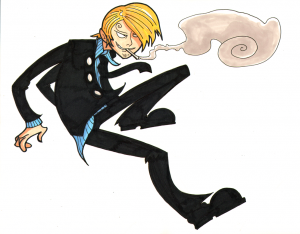
"Sanji" By Matthew J. Rainwater
Now, the world has just become a massive arena and every story is just a way for Oda to show off where the Strawhat Pirates stand in martial relation to the rest of the world, which means he slogs down the pacing to focus on filler battles so the Strawhats can look cool for the first time in years, or has them struggle mightily against throw-away supporting characters as a way to show that Luffy and company are STILL, after all of their training and the introduction of the painfully vague haki abilities, relatively unexceptionable.
With all of that focus on combat, there is no time left for exploration. With all of the heavy-handed moralizing and relentless despair, there’s no more time for the pure, simple enjoyment of an innocent adventure. And yet, the series is not dead. No, in spite of everything, One Piece still remains leagues beyond its contemporaries. Because even when it fails, it fails originally. It fails because Oda has become too ambitious, hoping to amp up the scale of the world by dwarfing the impossibly impressive Luffy with hyperbolically powerful characters; it fails because Oda thinks that he can make his series important by pushing the naturally anarchic themes of a series that idealizes pirates to its logical extremes. So even as it crashes and burns and loads itself down with so much generic baggage, it’s interesting to see how Oda twists the clichés and makes them his own. While his peers putter around looking for a way to keep their popularity polls up and so keep their series going, Oda is interested in pushing his style as far as it will go, introducing ever increasingly bizarre character designs and powers with each new chapter, experimenting with just how much he can cram into each panel and just how wild his visuals can get. Whole oceans freeze, fists of magma rain from the sky, holes in reality begin to crack open, and the pages these insane events are drawn on begin to buckle under the weight. Though it is a warning about the dangers of unchecked ambition, Oda’s failure is also fascinating, because it is so completely his. If even in failure he can find some redemption, Oda proves himself that rarest of comic artists: a true original. And that’s worth a million hackneyed, workmanlike authors capable of producing the merely competent.
-Austin Price






